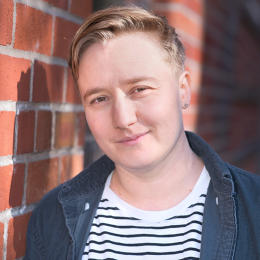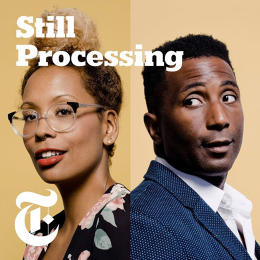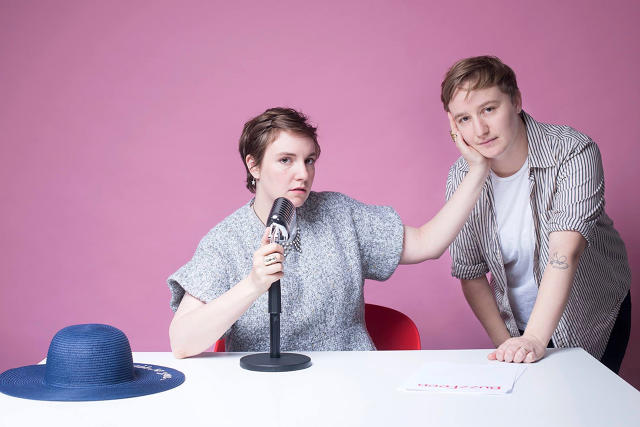Jenna Weiss-Berman: “I’m Proud Of Making Stuff Not Just For White Guys”
Jenna Weiss-Berman is no stranger to side hustles and 80-hour workweeks. Even after joining BuzzFeed as its first-ever director of audio and producing hugely successful podcasts like Another Round and Lena Dunham’s Women of the Hour, she continued to make podcasts on weekends, adding to a production resume that includes NPR, The Moth, and WNYC.

Then, earlier this summer, Weiss-Berman quit her job at BuzzFeed, became a parent, and started her own podcasting company—all in the span of a couple months. Pineapple Street Media, a full-service podcast production company she cofounded with Max Linsky (who also cofounded Longform), has already premiered Hillary Clinton’s show (the first ever for a presidential candidate) and a new podcast for the New York Times called Still Processing, and has shows in the works with Wieden + Kennedy, and Dunham’s Lenny. The company is already profitable, and has no venture backing.
But why leave BuzzFeed? Fast Company sat down with Weiss-Berman to get the answer, plus learn how she stays creative, and what Pineapple Street has in the works for the coming months.
So . . . do you want to talk about why you left BuzzFeed?
[Laughs] Sure. I had a really good time at BuzzFeed. I started the podcast division there. Since no one at BuzzFeed had done anything with podcasts before, I sort of had to run a company within a company. So I was working on not just content but also sponsorships and finding ad partners for our podcasts. I was working on legal contracts. I was dealing with all the different sides of it, not just being a producer, and I was running the department and managing the staff. It taught me how to have my own business.

But I kept constantly hearing from people who wanted to start podcasts but didn’t know how to, whether it was somebody at a big media company or a celebrity or an interesting person who wanted to start a show. And I’m lucky enough to have this skill set that’s kind of rare in this world—podcasts blew up fairly recently and I happen to know how to make them. I feel extremely lucky that I got in at a good time. So my friend Max Linsky, who runs the company Longform, was also hearing from tons of people, he knows a lot of journalists through his work at Longform, and all different places. He knew the New York Times was starting a division and he had a friend who asked us to start a show there. We both kept hearing from people and we didn’t want to keep saying no when people asked us to help start podcasts. We wanted to say yes.
We started looking around and realized there are podcast companies but there are very few places that are in the business of production. They’ll produce their own shows, but they don’t want to produce other people’s shows. So we were like, what if we became these smart, good producers for hire and we worked within different companies and help them get their podcasts off the ground, produce them, soup to nuts or whatever. So we started Pineapple Street to confront that problem.
Yeah, it feels like you all are a firm, like an architecture firm for podcasts.
We are! Yeah, I like that. So we’re doing a lot of shows for other people, mainly for media houses. We’re doing Lena Dunham shows and a bunch of Lenny spinoffs. But we’re also going to make original content that we own, so we will have intellectual property. And then we’re also doing branded content for big companies, like a major bank and a huge cosmetics firm.
To backtrack a little bit, you come from places like NPR and WNYC and these places that are very much audio first. What was it like coming into BuzzFeed, where that might not necessarily have been the case?
Yeah, well to be honest it was really hard. It was me trying to convince people why I needed certain resources. It’s a great place, BuzzFeed, and they got on board with it. But it’s really hard to work at a not-audio-first company. It was a huge challenge, but it went really well. We ended up creating big hit shows and BuzzFeed fully supported those shows. It is nice to be back doing my thing, which is audio first. But what BuzzFeed taught me that was super invaluable was how to make podcasts for non-audio companies. And that’s what we’re doing here. Our work with Hillary Clinton or the New York Times or Lena Dunham—those places aren’t audio companies, but they’re turning to us to try to help them put their stories into an audio format.
You were talking about running both the business and editorial sides while at BuzzFeed, did that prepare you for Pineapple Street also?
Yeah, I learned so much by having to figure out what a good podcast CPM rate is for an advertiser and all about the business side as an advertiser. I had to meet with the business teams at BuzzFeed and explain to them how podcasts work, and this is a good CPM rate, here are people who advertise on podcasts, here are some people who might want to advertise on podcasts. Writing contracts for Lena Dunham, I worked with our lawyers on that. I totally learned how to run a business when I was at BuzzFeed. And I was like, I love BuzzFeed but what would be even cooler is if I could do this for myself. And when I started telling people about it they were like, of course you should do that. You should have done that a long time ago.
When Max came to me and was like, “Why shouldn’t we start a business together?” the only reason I gave him was fear. I’ve never had my own business. I’ve always worked for other people. I had a baby a month after we started this business, it was like an insane time. I would have gotten a three-month paid maternity leave at BuzzFeed. Instead I quit my job just before my baby was born and that is actually how much I believe in what we’re doing and how much I think we’ll succeed. This is the perfect time to have a podcast business, podcasts are blowing up everywhere and everyone wants one. So I was willing to take a big risk right before my baby was born.
What is a good podcast CPM rate?
Oh! It totally depends on who the host is and what the show is. With a show that has a celebrity host that companies want to associate their brand with, you can get between $100 and $200, which is amazing. And that would be like $100 for a mid-roll ad, and if your show has 500,000 listeners and you’re doing 10 episodes, what’s the math there? So you might get $50,000 an episode for that one mid-roll ad. But if you do more, you could get over $100,000 per episode. But that’s pretty rare. It’s usually the case that a really good CPM on another show is like $30 for a mid-roll and maybe $20 apiece for two pre-rolls. And on a podcast with 150,000 listeners, that comes out to about $12,000 an episode. So then if you’re doing 50 of those a year, that’s $600,000, so it’s not bad. Not as good as 10 episodes at that other rate.
And a lot of what we’re doing is not CPM-based. For example, when we do shows with the New York Times or for Hillary Clinton, we’re just getting paid on a per-episode basis. Hillary Clinton doesn’t have ads in her podcast, that would be weird. So we just charge them a fee and it varies for everyone we work with. So we have a few different revenue streams—some of our shows we do revenue split with, some we just get paid a fee-for-service per episode, and for our own stuff we take our profits and pay out our hosts. It’s interesting . . . the New York Times pays you a certain amount of money, and then a major bank pays you uh, a different amount of money [laughs]. And I think we’re actually going to make really interesting branded content. We want everything we do to be really good. And on some of the branded stuff we make more money than we do on the not-branded stuff, and that allows us to take more risks in other content.

So I know part of your vision at BuzzFeed was to make podcasting less of a boys’ club and less geared toward older audiences (as opposed to most public radio). Looking back, how would you evaluate yourself as having succeeded in that vision?
I feel very proud of what we did at BuzzFeed. I think that Another Round was kind of the first really well produced show hosted by black women. I don’t want to sound like it was the first one with black hosts—it was not, at all. But it felt like the first really well-resourced podcast with young black women as hosts. And I think it really started a big trend in podcasting. After we launched, WYNC launched Two Dope Queens, which has been a big hit. There were places all around us that said, okay, I guess there is a black audience for podcasting and maybe we should make content for them. I’m proud of any role I had in making stuff not just for white guys. I think we worked really hard to bring in younger audiences, and Lena’s show definitely did that too. Podcast stats are notoriously not great, but we got a lot of tweets about it and so we have some level of Twitter evidence that told us a lot of that audience was women between 18 and 25. And that hasn’t been the main podcast audience before.
I think everything I do, I always want to strive to bring in new audiences to podcasting. I have this crazy dream of making a kids’ show, like the Sesame Street of podcasts. It would be such a guilt-free listening experience for parents because they don’t put their kid in front of a screen. And then parents don’t have to listen to the same damn story CD every week or whatever. I guess people don’t listen to CDs anymore. I just remember when I was a kid I listened to a Rapunzel tape every day for two years, and I can’t imagine how that made my parents feel.
We’re working on a bunch of stuff for young women of color. We’re working on a travel show focused on women of color that is hosted by Aminatou Sow of the Call Your Girlfriend podcast. So that will be coming out soon. We’re doing a culture show at the Times with Wesley Morris and Jenna Wortham.
Pineapple Street recently produced the podcast for Hillary Clinton. How did that come about?
So Hillary had been on Another Round when I was producing that show. I have some friends who work on the campaign, so I stayed in touch with them. And when we started Pineapple, Max and I were like, what would our dream shows be? We were just sitting around, thinking, what do we really want to do here? And we were like, wouldn’t it be amazing if Hillary Clinton wanted to have a campaign show? One that wasn’t just us walking around her campaign office interviewing people about why they’re working for her, but that was just her speaking honestly about her life on the campaign trail and how exhausting it can be, and what she eats and the stuff you just don’t hear her talk about. So we emailed her campaign and they were like, “Oh my god, we’ve been wanting to make a show like that for a year, we just haven’t really been able to figure out how to produce it.” And we were like, well that’s what we do.
We had a bunch of meetings with them. The team is incredible—it feels a lot like BuzzFeed. Her office is all these really cool young people who are passionate about what they’re doing. They’re super professional and awesome and smart. And it was interesting because I worked in public radio and at BuzzFeed, and I couldn’t ever be political because I was working at these news outlets. So it was kind of fun to be like, I want to make a Hillary Clinton podcast because I feel like it’s a good medium for her, an intimate medium, and it’s a way she could connect with an audience in a one-on-one way, not just giving a speech. And I can be like, I’m a fan of Hillary Clinton. I really want her to win this election. And I don’t have to pretend that I don’t anymore!
Yeah, I was going to ask about the mind-set shift from Another Round, where Heben and Tracy asked her all these really tough questions, to this kind of podcast.
Yeah, we’ve gotten criticized for that a bit. We’ve read the criticism. I read the Politico article. And I get where they’re coming from. They’re upset Hillary Clinton isn’t talking to the press. And that has nothing to do with me or what I’m doing. We are not pretending to be journalists. I’m not pretending to be an unbiased journalist. A way that I also feel is that I love journalists, but journalism isn’t the only way to get someone to talk about something interesting. We’re going to ask different questions of Hillary than a journalist would, and she’s going to tell different stories. That doesn’t mean that they’re not true and they’re not valuable. I think what we’re doing is true and valuable even though we’re not journalists. Like I said, we’re not pretending to be journalists. Journalists do amazing work that’s totally unrelated to what we do. We’re podcast producers, we’re Hillary Clinton fans, we wanted to use the skill we have to contribute to her race, basically . . . I don’t know, I just fucking want her to win.
So with the Lena Dunham podcast . . . how did that move from BuzzFeed to your domain? Had you already decided you wanted to do something together outside of BuzzFeed?
Lena is an old friend of mine, we went to college together, I dated her roommate—that’s how we know each other. She and I had been talking about podcasts long before I started working at BuzzFeed. And I basically said, “Why don’t we do this? I am at BuzzFeed, so it would be a BuzzFeed podcast, would you want to do that?” And she agreed. And that was just as Lenny was starting out, it wasn’t yet its own real thing. So then Lena came to me and said, “Look, I wanna to do a second season of Women of the Hour, but I have Lenny now and I want to do it for Lenny.” She didn’t want to do it for another journalistic outlet, for obvious reasons.
That was after Max and I had already been talking about Pineapple. So it was just yet another really good reason to leave. I loved doing her show, it was so good, it won awards. It was really fun to make. We had such a great time. And thinking about doing it outside of BuzzFeed was appealing, and being able to get sponsorships for it and have a real budget and all this stuff. I was like, that sounds really cool.

So that will be Women of the Hour season 2? The same name and everything?
Yep, and it will be twice as long. She owns it, so BuzzFeed didn’t own it. And to be fair, BuzzFeed didn’t really want to do the show again. They really want to focus on internal talent, which makes sense because they have a ton of amazing internal talent. Lena doesn’t make sense as a show for them. And that’s also a big part of why I left. I loved working with BuzzFeed internal talent, but I really want to expand who I’m working with. I love that I get to work with Hillary Clinton one day, the New York Times one day, awesome culture writers the next day, Lena Dunham the day after that. All these cool projects we’re working on, I just love to have a real diversity of content that I’m working on and I can do that a little more now.
What are some challenges you’ve had so far with Pineapple?
I mean, running a business is really fucking hard. When you work for a company you’re shielded in some ways from the deepest bullshit. You deal with some bullshit, like you might be the one to write up a contract, but you don’t have to be the one fighting for that contract. It’s really hard to deal with criticism. With this Hillary Clinton show coming out, even though it got great reviews and people loved it, there were these journalists who were calling it propaganda. Which I truly don’t think it is. It’s just looking at her from a different lens. So I’m trying to figure out how to deal with criticism.
The money stuff has been less of a challenge than we thought it would be, to be honest. I don’t want to sound too cocky. We thought we would probably be digging from our savings for a year. Or before we started we considered taking venture capital. Not doing that has been amazing. We were able to really quickly get a bunch of contracts done and start making a profit in two months. It’s been really shocking and I’m proud of that.
So what has it been like growing a baby and a company at the same time?
I’m really fucking tired. It’s hard. My job in my family is that I’m tasked with making all the money, and my spouse is tasked with taking care of the baby. So I really need Pineapple to do well.
The way I built my career is by taking on a ton of side hustles. So I was working a full-time job but I was also editing the Longform podcast, I was producing a podcast for the Believer magazine, I’d be editing a show for the New Yorker, and NPR, and WYNC at the same time. I kind of got my name out everywhere. So what I’ve done since starting Pineapple is I’ve dropped all my side hustles so I could spend my evenings and weekends with my baby. And I don’t regret losing the side hustles. I spent three years working 80-hour weeks, and I’m ready to have a company that is successful and a family that is also successful. Max also has a little kid, a not yet 2-year-old, so it’s been nice to have a business with someone who understands the challenges of work and family.
So how do you stay creative without burning out?
I stay creative by being a part of many different kinds of projects that are vastly different from each other. Everything is super different, not just in who the hosts are but in the style. We do some things that are straight two-way chat shows. We’re working on a show I can’t talk too much about, but it’s a mystery series basically, not a crime show, but trying to find someone who has disappeared from the public eye. And that’s a very highly produced story-driven show that’s super different from a two-way talker.
I’m really lucky right now. I’m so interested in all the projects we’re working on, even this show we’re making for a big bank. It’s going to be a really interesting show that tackles things I’m really curious about but don’t really understand, like how a company goes public and what that means, or an episode about athletes and wealth management and how some athletes will be 18 and they blow all their money. Even the branded stuff we’re doing, we only want to do branded stuff that feels really interesting to us. We want to take content and make it really fascinating. I’m genuinely excited about all our projects and I get to peek in on each one and help edit and work with hosts. So much of my job is coming up with ideas for stories and then making them happen. It’s really cool.
What is your ultimate vision for Pineapple Street? Who are some dream people you’d like to work with?
I’m kind of working with them, which is crazy. My dream people would be like, a presidential candidate, an actress I love, the best publication in the world—oh, I shouldn’t say that because you work for one. One of the best publications in the world. Big ad firms, big brands. We’re really doing it. A next dream would be to really start developing original content not related to brands. What I want to do is build Pineapple in a way that is smart, I don’t want to build it in a way where we get cash infusions but aren’t really making actual money.
I want us to always be thinking, what is the staffing structure that can make us money? I want us to always be making really cool and interesting stuff. We want our staff to be proud of the stuff we’re putting out. And I’d love to see it grow to a place where in two years we have like 20 ongoing shows that are really good and a staff of maybe 20 people. This is something I’ve thought about a lot—we don’t feel like we need to be the biggest podcast company in the world. We want to be among the three to five best. And I think we’re really headed there.
Fast Company , Read Full Story
(19)













